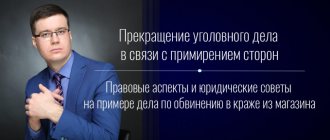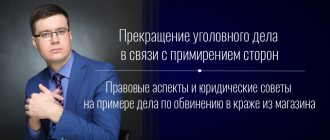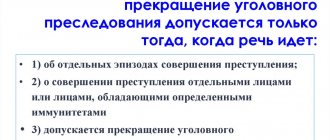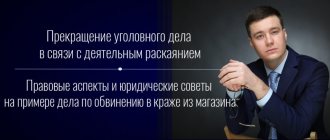Is it possible to terminate a criminal case under Art. 318 of the Criminal Code of the Russian Federation for reconciliation of the parties?
In my practice, I have encountered criminal cases under Art. 318 of the Criminal Code of the Russian Federation (use of violence against a representative of the authorities), which ended extremely favorably for the client. I have already written about one of the most interesting examples of such a case, which was subsequently dismissed in court. However, in the described case it was a question of termination of the case on the grounds provided for in Art. 28 of the Code of Criminal Procedure of the Russian Federation (in connection with active repentance), but regarding the possibility of termination of this category of cases under Art. 25 of the Code of Criminal Procedure of the Russian Federation (reconciliation of the parties), as they say, opinions were divided.
If you do not go deeply into the theory of criminal law and process, then the answer to the question posed in the title of the article will be yes, termination of a criminal case under Art. 318 of the Criminal Code of the Russian Federation on the grounds provided for in Art. 25 of the Code of Criminal Procedure of the Russian Federation, that is, in connection with the reconciliation of the parties, it is possible. In fairness, it should be noted that from the point of view of this very theory and in my personal opinion, this is not correct and such a practice is vicious. The fact is that the object of a criminal attack in this case is not only the life and health of a specific law enforcement officer, who, in general, may not have any claims against the offender, but also the normal activities of the authorities and the state as a whole. And the state, as we know, will have claims against you to the last. Thus, you can reconcile with the victim, but you cannot reconcile with the state represented by one or another government agency. To put it in dry legal language, the corpus delicti under Art. 318 of the Criminal Code of the Russian Federation is two-objective.
Now you should have a question, why then can you find on the Internet many court decisions, or decisions of investigators on the termination of criminal cases of this category precisely for the reconciliation of the parties? No, the point is not that all respected people who made such decisions are fools, but one lawyer of the Plesovskys is smart. There is still no consensus on this issue, so the law is interpreted differently, but you cannot know for sure what position the judge considering your case will take. It does not matter for the client on what grounds the case against him will be terminated: in both cases an admission of guilt is required. It is for this reason that I adhere to the position that it is possible to terminate the designated category of cases precisely on the grounds provided for in Art. 28 of the Code of Criminal Procedure of the Russian Federation, that is, in connection with active repentance. And I have this practice.
In general, the conditions that must be met for an official (investigator) or judge to terminate a criminal case due to reconciliation of the parties will be the same as for terminating the case due to active repentance. However, there is an important point that needs to be noted.
It’s no secret that “reconciliation” is often achieved by injecting a certain amount of money in favor of the victim. Moreover, there is nothing illegal in such a mechanism for resolving mutual claims (the transfer of funds can and should be documented). This state of affairs prompted the leadership of some law enforcement agencies, whose employees most often appear as victims in such cases (in particular, the traffic police, police department) to take an extremely tough position on this issue. I have more than once encountered the fact that injured employees would be happy to express their written consent to terminate the case through reconciliation of the parties, but they will never agree to this, since they have a direct prohibition from management. If the case is terminated due to active repentance, such consent is not required and the problem goes away by itself.
Which path to take is up to you, but sometimes (in fact, always) it is better to listen to the opinion of a lawyer.
acquittal under Art. 319, part 1 art. 318 of the Criminal Code of the Russian Federation
Case No. 1-110/10
SENTENCE
In the name of the Russian Federation (Russia)
Volgograd June 08, 2010
Central District Court of Volgograd, composed of presiding judge E.V. Guseva,
with the participation of state prosecutor L.V. Shuvalova,
victim FULL NAME2,
defense lawyer Knyazkov G.Ya.,
defendant Noskov D.N.,
under secretary Denisova Yu.G.,
having considered in open court Date anonymized d. criminal case against
NOSKOV Dmitry Nikolaevich, Date anonymized...,
accused of committing crimes under Part 1 of Art. 318, art. 319 of the Criminal Code of the Russian Federation,
INSTALLED:
Noskov D.N. accused of committing Date anonymized at approximately 02.20-02.40 o'clock. public insult to a government official in the performance of his official duties, and the use of violence not dangerous to life or health and the threat of violence against a government official in connection with the performance of his official duties, that is, the commission of crimes under Art. 319, part 1 art. 318 of the Criminal Code of the Russian Federation in relation to the platoon commander of the battalion ... police lieutenant FULL NAME2
In fact, Noskov D.N. at the specified time in relation to the specified victim did not commit any criminal act.
The court established other circumstances of the incident Date anonymized at approximately 02.20 - 02.40 Noskov D.N., being in the premises ..., at the address ..., having the intent to violate public order, expressing clear disrespect for society, while intoxicated , committed petty hooliganism, namely, violated public order in the premises..., expressing obvious disrespect for society, for the persons present in the premises, expressed his disobedience to the lawful the request of the specified person performing duties for the protection of public order and suppressing violations of public order.
That is, the court found that Noskov D.N. committed an administrative offense, liability for which is provided for in Art. 20.1 part 2 of the Code of the Russian Federation on Administrative Offences.
The court came to this conclusion based on an examination at the trial of all the evidence presented by both the prosecution and the defense.
So, in particular, D.N. Noskov, interrogated at the court hearing as a defendant. He did not admit guilt in full, citing the fact that he was carrying out the duties of a journalist, and he was subject to illegal opposition to journalistic activities and illegal criminal prosecution, and showed that he considered himself a victim of police brutality. After a conflict in the club, where he was for 1-1.5 hours, he was asked to help as a journalist, and he volunteered to help, since he had an editorial camera with him. He was sober. I went to ..., the door was closed, he called, they opened it for him. He tried to contact the police officer, introduced himself, and asked him to explain to him what was happening. They didn’t answer him, the situation became tense. He was asked to leave. He warned that if he sees illegal actions of police officers, he will start filming. When he saw that FULL NAME14 was being handcuffed, he started taking photographs. After taking the picture, he was attacked by FULL NAME2 and knocked out of his hands the camera, which was hanging on his belt. FULL NAME2 tried to pull the camera towards him silently and treacherously. After FULL NAME2 he grouped himself and pressed him to the wall with his back, police officers ran up, sat him, Noskov, on the floor, and handcuffed him. He himself did not hit FULL NAME2 and did not try to hit. After everything, everyone laughed at him and confiscated his personal belongings for no reason. He made no threats to anyone. He added that he spoke in a raised tone, and even used an “idiomatic expression” after FULL NAME2 knocked out the camera from him.
The prosecution in the court hearing as evidence of the alleged commission of Noskov D.N. The following evidence was presented for criminal offenses.
Interrogated at the court hearing as a victim, Full Name 2, testified that he was a police officer, and the date was anonymized. He was on duty as a platoon commander. At night there was a call to the club..., as a result of which one citizen (FULL NAME14) was detained and taken to.... Noskov D.N. also expressed a desire to go to ..., tried to find out the reasons for the detention, FULL NAME14, showed his ID, said that he was a representative of the press. In... Noskov D.N. walked through the turnstile, waving his ID, using obscene language, including at himself. In particular, obscene language by D.N. Noskov. it was said that it would be bad for all of them, they would all be fired. There was also obscene language addressed to him in the sense that he would feel bad and would be fired. After making a demonstrative statement that all unlawful actions would be photographed by him, Noskov took the camera standing on the table and tried to take a photo. He did not react to his, FULL NAME2, comments to stop taking photographs. After which a struggle ensued. Noskov hit him with his left hand. There was a glancing blow to the head that did not harm him. The blow was not brought to the required stage, since he, FULL NAME2, dodged. After which Noskov was detained. At the same time, he was handcuffed. He was taken for examination, which showed that he was intoxicated.
At the request of the defense attorney, at the court hearing, due to contradictions, the testimony of the victim, FULL NAME2, given by him during the preliminary investigation (vol. 1pp. 42, 64) was read out, according to which Noskov D.N. resisted him after the ban on taking pictures with the camera, tried to hit him with his left hand, since he was holding the camera in his other hand, but he did not succeed, since he, FULL NAME2, held his hand.
What directly obscene words did Noskov D.N. allegedly insulted FULL NAME2, the victim himself did not explain either at the court hearing or during the preliminary investigation. As you can see, FULL NAME5 defendant Noskov D.N. did not insult, since Noskov D.N. obscenely only threatened all police officers with certain negative consequences. Specific insults of a personalized nature, Noskov D.N. didn't say it.
It is also seen that there was no violence, as well as a threat of violence against FULL NAME2, since Noskov D.N. only waved his hand in response to actions directed against him, and his action was stopped.
This can be seen not only from the testimony of the victim, FULL NAME2, but from the testimony of witnesses in the case from the prosecution, in particular direct eyewitnesses of the conflict. Date anonymized.
Thus, the witness FULL NAME 6, a police officer, interrogated at the court hearing, testified that FULL NAME 2 tried to prevent Noskov from taking photographs, blocked him, tried to take the camera, and Noskov hit him, where, he does not remember. After which he, FULL NAME6, jumped up and pressed D.N. Noskov. against the wall and he was detained. Noskov insulted everyone, was excited, and said about all the policemen that they were a bunch of bandits. During what was happening, he, FULL NAME6, was with Noskov D.N. and FULL NAME2 with his back, but turned his head and saw everything.
At the request of the defense attorney, in connection with the contradictions in the court hearing, the testimony of the witness FULL NAME6 (vol. 1pp. 36) was read out, according to which the police officer was hit by D.N. Noskov. it didn’t work out, as he ran up to D.N. Noskov. and together with FULL NAME2 prevented his illegal actions. And before that Noskov D.N. expressed his dissatisfaction in an obscene form.
After the reading of the said testimony, witness FULL NAME6 clarified that he did not see the fist, but saw the swing.
Thus, the witness does not confirm that FULL NAME2 was struck.
The witness FULL NAME7, a police officer, interrogated at the court hearing, testified that Noskov D.N. in ... the police officers present in general. The meaning of his statements was: “I’ll figure it out, you are not police officers, everyone will be punished.” Then he saw that Noskov was struggling with FULL NAME2, in particular, he, pinching him, tried to strike FULL NAME2. At the same time, in the hands of Noskov D.N. There was nothing. Noskov D.N. tried to strike, but they were separated. Despite the fact that Noskov D.N. insulted all the police officers, a statement was written against him by Full Name 2, since he came to help, and because he is a platoon commander.
The witness FULL NAME8, questioned at the court hearing, testified that he witnessed the conflict in the Vosk club, after which everyone was taken to ..., where D.N. Noskov also arrived, who was not a party to the conflict, but began to sort it out. Noskov D.N. behaved inappropriately, was drunk, and insulted everyone present. Noskov grabbed the camera and said that he was conducting a journalistic investigation. They asked him to calm down, but he did not give up the camera. He heard Noskov sending FULL NAME2 in different directions and threatening various punishments. He used obscene language. He did not hear Noskov specifically expressing punishment against anyone. When they tried to take the camera away from Noskov, he grabbed it and tried to strike, either a punch or a push. He didn't see the impact.
At the court hearing, due to some contradictions, the testimony of witness FULL NAME8, given by him during the preliminary investigation (vol. 1pp. 58), according to which Noskov D.N. initially spoke obscenely at him, then at the police officers, including FULL NAME2, after the latter tried to take D.N. from Noskov. camera, Noskov D.N. swung at the police officer FULL NAME2 with his hand clenched into a fist, but he failed to hit the police officer, since his actions were stopped by another police officer.
After the announcement of the said testimony, the witness FULL NAME8 fully confirmed it.
Assessing the testimony of this witness, the court draws attention to the fact that the witness cannot explain what specific insults were allegedly made by Noskov D.N. directly addressed to FULL NAME2. It is seen that Noskov D.N. made obscene remarks to all persons present, including his, FULL NAME8, address.
According to what was announced at the court hearing in connection with exceptional circumstances preventing the appearance at the court hearing, witness FULL NAME9 - participant in the previous conflict in the club ... (vol. 1pp. 170), in the premises of the police department ... ... Noskov D.N. was intoxicated, behaved violently, spoke obscenely, police officer FULL NAME2 tried to calm Noskov D.N., but he did not react, and began to speak roughly obscenely at him. When the police officer FULL NAME2 asked Noskov D.N. not to take pictures, he began to resist, tried to hit the police officer FULL NAME2, swung at him.
As you can see, the said witness also does not indicate what exact words, which carry what exact meaning, Noskov D.N. spoke obscenely at a specific police officer FULL NAME2; it is also seen that violence against FULL NAME2 Noskov D.N. was not implemented.
The witness FULL NAME10, interrogated at the court hearing, testified that she is the boss of the defendant Noskov D.N. During the specified period, Noskov D.N. approached her with the material “Cop Lawlessness,” which she treated as ordinary material. The article was published in the newspaper. Noskov had a camera in his possession, which just disappeared at that time. Noskov explained that at night he recorded unlawful actions of police officers, and his camera was taken away.
At the court hearing, FULL NAME11, who was recognized at the preliminary investigation as a specialist, gave his explanations and explained the procedure established by law for the activities of a journalist.
According to the testimony of the specialist FULL NAME11, read out at the court hearing, given by him during the preliminary investigation (vol. 1 case file 231), the journalist is obliged to be guided by the Law of the Russian Federation “On the Mass Media”, and when located in a state institution of the Ministry of Internal Affairs of Russia - also by the regulations or regulations on the work of internal affairs bodies.
The court takes into account the opinion of the specialist in the case, FULL NAME11, but believes that by-laws, such as regulations or regulations on the work of the internal affairs department, should not contradict the Constitution of the Russian Federation and federal laws.
The prosecution at the court hearing to justify the guilt of Noskov D.N. in committing allegedly criminal acts, a number of written evidence were presented
So, according to a copy of the work order..., the battalion platoon commander... police lieutenant FULL NAME2 was on duty from 20.00 o'clock Date anonymized until 08.00 o'clock Date anonymized (vol. 1pp. 51-52).
A copy of the extract from the order dated Date anonymized, confirms that Full Name 2 actually serves in the internal affairs bodies as a battalion platoon commander ... dated anonymized (vol. 1pp. 45).
From a copy of the job description it follows that FULL NAME2 is entrusted with the performance of duties to prevent and suppress crimes and administrative offenses (vol. 1pp. 46-49).
These circumstances are not essentially questioned by the court.
As can be seen from the protocol AB - 34 Number anonymized 18897 about an administrative offense dated Date anonymized at 02.40 o'clock ..., Mr. Noskov D.N. made a scandal, swore with rude obscene language, insultingly pestered citizens, did not react to the comments of others, did not respond to the demands of police officers to stop illegal actions, that is, he committed an offense, liability for which is provided for in Art. 20.1 Part 2 of the Code of the Russian Federation on Administrative Offenses
In the said administrative violation protocol there is an explanation from the violator D.N. Noskov: “The detention was carried out in violation of legislative and procedural norms. The witnesses were interested in my arrest. The police beat and pushed me. I acted on the basis of the Federal Law “On the Mass Media” and demanded the truth. Instead, I was handcuffed. I believe that my civil rights have been grossly violated. I will contact the Prosecutor General’s Office of the Russian Federation and other authorities.”
The court believes that the specified protocol on an administrative offense, with the exception of the indication that Noskov D.N. allegedly molested citizens (since there is no information about this), most fully corresponds to the circumstances that took place. Date anonymized.
According to the medical examination protocol Number anonymized from Date anonymized, it was established that Noskov D.N. at the time of the examination he was intoxicated (vol. 1, case 25).
The court has no reason not to trust the specified medical examination protocol, despite the fact that Noskov D.N. denies the fact that he was intoxicated, since the qualifications of the person who conducted the medical examination, the method by which the said examination was carried out, are confirmed by other evidence presented at the court hearing by the prosecution.
From the testimony of witnesses in the case on the part of the prosecution, it is also clear that Noskov D.N. was intoxicated. That is, the evidence indicated is consistent with each other.
Arguments of Noskov D.N. This part is not supported by any evidence.
As can be seen from the copy of the order, the person who conducted the medical. examination of Noskov D.N. – Full name 12 is a psychiatrist-narcologist at a narcological office... from Date anonymized, works in an examination room for alcohol intoxication. Number is anonymized of the expert department in the position of a psychiatrist-narcologist of the 11th category (vol. 1pp. 166).
A medical equipment product - the Lion Alcometer ethanol vapor analyzer, with the help of which the medical examination of D.N. Noskov was carried out, is registered in the Russian Federation and entered into the state register of medical devices and medical equipment; certified; tested and found suitable for use (vol. 1 pp. 167, 168, 169).
In addition, according to the testimony of the witness FULL NAME13 announced at the court hearing due to the impossibility of ensuring the appearance (vol. 1 case file 160), she gives a professional assessment of the protocol of the medical examination for the state of intoxication of D.N. Noskov. from Date anonymized, indicating the absence of the need for any additional research, and the impossibility of achieving alcoholic intoxication due to the use of a therapeutic dose of medications (Corvalol, propolis tincture).
As follows from the responses from the Internal Security Department of the Central Internal Affairs Directorate for the Volgograd Region and the Information and Public Relations Department of the Central Internal Affairs Directorate for the Volgograd Region, visits by media representatives to the facilities of the Central Internal Affairs Directorate for the Volgograd Region are carried out in the order of paragraphs. 48, 49 of section 8 of the order of the Central Internal Affairs Directorate No. impersonal number-07 dated Date impersonal, namely: representatives of the media are allowed into the facilities of the Central Internal Affairs Directorate according to official notes signed by the head of the information and public relations department of the regional Central Internal Affairs Directorate or the person performing his duties, accompanied by a department employee information and public relations of the Central Internal Affairs Directorate; media representatives are allowed into events held at the facilities only after checking the equipment they are carrying and a personal search using technical means (vol. 1pp. 243).
In assessing this evidence, the court also proceeds from the fact that by-laws, in particular the order of the Central Internal Affairs Directorate, must comply with federal laws and the Constitution of the Russian Federation, which impose such restrictions on citizens - representatives of the media, in particular if it is necessary to record any event occurring At the moment, they are not installed.
At the same time, the court does not consider that Noskov D.N. acted in the circumstances under consideration as a journalist, since he was intoxicated, which does not meet the requirements of the professional activity of a journalist.
At the court hearing, in addition to the testimony of D.N. Noskov himself, evidence presented by the defense was also examined.
The witness FULL NAME14, interrogated at the court hearing, testified that on the night of Date anonymized on Date anonymized he and his company were relaxing in the club ... where a conflict arose between him and another visitor to the club, after which the police officers took them to .... Noskov arrived in ..., showed his identification, introduced himself that he was a journalist, and spoke loudly, since no one answered him or paid attention to him. Noskov walked behind the turnstile with a camera and said that he could take photographs if he deemed it necessary. There was a raised voice. When they began handcuffing him, FULL NAME14, Noskov pointed a camera in their direction, after which he, FULL NAME14, was taken away, and he didn’t see anything else. Noskov was then also placed in a cell. He believes that Noskov behaved appropriately and did not insult anyone.
Apparently, this witness was not essentially an eyewitness to how exactly the camera was taken from D.N. Noskov, and what he did or said at the same time.
Witness FULL NAME15, an ambulance doctor, questioned at the court hearing, explained that she was picking up D.N. Noskov. from... Date anonymized at 08.00, due to heart complaints, while it seemed to her that he was not intoxicated. Along the ambulance route Noskov D.N. explained that he felt better and refused hospitalization.
The court draws attention to the fact that the testimony of this witness does not contradict the available evidence confirming the state of intoxication of Noskov D.N., since the medical examination of Noskov D.N. for intoxication was carried out at 05.40 o'clock, and he committed the offense even earlier, at 02.20-02.40 o'clock, while the witness FULL NAME15 saw Noskova D.N. after a long period of time.
Other arguments of the parties, as well as the evidence presented at the court hearing, do not meet the criteria for the relevance of evidence or any significance for qualifying the actions of D.N. Noskov. Dont Have.
Having assessed all the evidence presented at the trial from the point of view of its relevance, admissibility, reliability and sufficiency, the court came to the conclusion that the prosecution had not proven that the acts of which the defendant was accused took place.
They do not constitute a crime under Part 1 of Art. 318, art. 319 of the Criminal Code of the Russian Federation, since the objective side of these crimes has not been established: 1) Noskov D.N. did not personally and personally insult FULL NAME2 (Noskov D.N. spoke obscenely to all police officers present in the premises, as well as to the police in general, while the meaning of his obscene statements was not limited to personal insults, but to subsequent negative consequences in against police officers for their actions). 2) Noskov D.N. did not use violence against FULL NAME2, nor did he threaten FULL NAME2 with violence (the swing of his hand by Noskov D.N. was made in response to the actions of FULL NAME2 to take the camera from him, and was not fully implemented, since it was stopped; essentially by Noskov D .N. resistance was offered, not violence was used).
Also, the subjective side of these crimes has not been established, since the intent of Noskov D.N. was not aimed at public insult, the use of violence, the threat of violence against a representative of the authorities during the performance and in connection with the performance of his duties, but only at a violation of public order, accompanied by obscene language, associated with disobedience to the demands of a police officer.
In the actions of Noskov D.N. only the composition of the administrative offense provided for in Part 2 of Art. 20.1 of the Code of the Russian Federation on Administrative Offences.
In this case, the court proceeds from the fact that, from the objective side, petty hooliganism is an action that violates public order and the peace of citizens. Such action includes obscene language in public places. Hooliganism can disrupt public order in any sphere of life and activity of citizens: at work, at home, in institutions; in any place where people are, including, as in this case, indoors....
From the subjective side, petty hooliganism is characterized by intent, usually direct. But, there may be cases where it was committed with indirect intent (as in this case). An important element of the subjective side is the motive of satisfying individualistic needs, self-affirmation by ignoring the dignity of other people.
As in the case under consideration, Noskov D.N., while intoxicated, used obscene language towards the police officer in general, pursuing the goal of satisfying self-affirmation by ignoring the dignity of other people.
Police officer FULL NAME2 is included in the circle of persons whose disobedience to legal requirements entails administrative liability under Part 2 of Art. 20.1 of the Code of the Russian Federation on Administrative Offenses (the list of specified persons is given in Article 19.3 of the said code). However, additional qualifications under this article are not required in this case.
At the court hearing, the defense’s arguments that Noskov D.N. were not confirmed. acted while performing the duties of a journalist, since the use of obscene expressions by a journalist is not provided for by the Law of the Russian Federation “On the Mass Media”. Likewise, the defense’s arguments that Noskov D.N. were not confirmed. was not intoxicated, since the objective evidence of the prosecution in this part was not refuted by reliable evidence of the defense.
Thus, the elements of crimes provided for in Art. 319, part 2 art. 302 of the Code of Criminal Procedure of the Russian Federation.
In accordance with Part 3 of Art. 302 of the Code of Criminal Procedure of the Russian Federation, acquittal on this basis means the recognition of the defendant as innocent and entails his rehabilitation in the manner established by Chapter 18 of the Code of Criminal Procedure of the Russian Federation.
There is no material evidence in the criminal case.
No civil claim has been filed in the criminal case.
Based on the above, guided by art. Art. 303-306 Code of Criminal Procedure of the Russian Federation, court
SENTENCED:
NOSKOVA D.N. find not guilty
in the commission of crimes provided for in Part 1 of Art. 318, part 1 art. 24 of the Code of Criminal Procedure of the Russian Federation, that is, due to the absence of elements of crime in the act.
Preventive measure against Noskov D.N. – subscription on his own recognizance and proper behavior – cancel.
Recognize D.N. Noskov the right to rehabilitation, explaining to him the right to compensation for property damage, elimination of the consequences of moral damage and restoration of labor and other rights.
The verdict can be appealed in cassation to the Volgograd Regional Court within 10 days from the date of proclamation. If a cassation appeal is filed, the acquitted person has the right to petition for his participation in the consideration of the criminal case by the court of cassation.
Judge: signature E.V. Gusev
The copy is correct: judge E.V. Gusev





